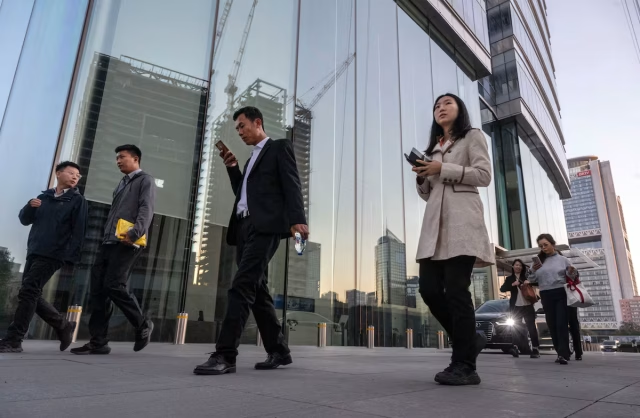Many citizens who don’t want to explain their employment status pay to rent a position in a fake office, with some even assigning fictitious tasks and organizing supervisory rounds.
For almost a year now, Zonghua has gotten up early, headed to the office, and returned home late at night. Apparently, she’s repeating the same routine that millions of people in China follow every day. But her day has a peculiarity: no one pays her to do it, and no one demands results. What to do — and, above all, what to say — while looking for a job has become a headache for more and more Chinese, who don’t want to provide explanations or expose themselves to uncomfortable questions from those around them. But in the country’s large cities, spaces that offer the solution have begun to spring up: companies that allow people to pretend to work.
For a daily fee of between 30 and 50 yuan ($4-$7), these companies offer desks, Wi-Fi, coffee, lunch, and an atmosphere that mimics any work environment. According to a report in Beijing Youth Daily, although there are no contracts or bosses, some firms simulate them: fictitious tasks are assigned and supervisory rounds are even organized. For a fee, the theatricality can reach unimaginable levels, from pretending to be a manager with his own office to staging episodes of rebellion against a superior.
Zonghua is Cantonese and prefers not to give her real name. Tired of traveling and the pressures of the financial world, she resigned from her position in the spring of 2024, she tells this newspaper via a local social media platform. “I was looking for a more stable life,” she writes. But she doesn’t dare tell her family the truth. At first, she went to libraries, but for the past few months, she has been paying a monthly fee of 400 yuan ($55) for a comfortable space to spend the day; it’s much cheaper than spending hours in a cafe. Zonghua doesn’t know how much longer this situation will last, as, for now, she’s not having any “success” with her applications.
In the first quarter of 2025, the urban unemployment rate stood at 5.3%, according to the National Bureau of Statistics. But the youth unemployment rate is much higher: in March, it reached 16.5% among 16- to 24-year-olds (excluding students) and 7.2% among those aged 25 to 29. And since the beginning of the year, this strategy of keeping up appearances has gained traction. Xiaohongshu (the Chinese Instagram) is full of ads for “pretend-to-work companies,” racking up millions of views. These ads also provoke debate. For some, it’s a way to relieve psychological pressure; for others, they only fuel job avoidance and delay entry into the labor market.
However, verifying their true reach is not easy: they are not listed in official records, and many operate informally, often coordinated through the messaging app WeChat.
An internet trend
EL PAÍS visited a location that uses this advertising gimmick, located in Beijing’s Shuangjing neighborhood. A sign for the law firm that owns the space hangs in the reception area. There are several meeting rooms and a lounge with capacity for 36 employees. On a Wednesday morning, there’s barely any activity. Three people seem focused on their computers, but a man is reclining in a chair looking at his phone, and a child is playing with a cell phone. The person in charge of showing this newspaper the facilities admits to having copied the concept because it’s trendy online. She explains that the lawyers rarely use the offices and decided to rent them out. In practice, it operates as a small coworking space.
The founder of another of these companies, also in the capital, maintains an active WeChat group of around 300 users where he shares photographs of the furniture and details of the space. Among the members is Xu Lin, a content creator. “Although some members do need a place to pretend to work, most of us are just there because it’s interesting,” she explains.
Meanwhile, Da Neng Mao, a builder, has joined because he believes this initiative “may create a new job opportunity.” Tian Tian, a part-time pilates instructor, believes that the idea “is practical, so that we freelancers have somewhere to go.”
SOURCE : english.elpais.com


















